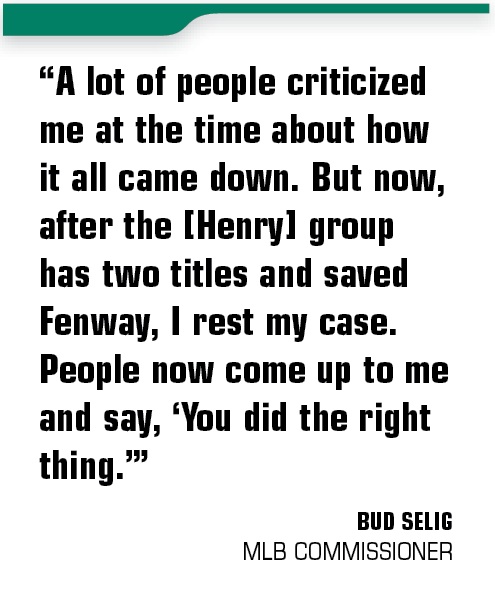Fenway Park’s centennial isn’t the only big anniversary being celebrated by the Boston Red Sox this year.
The 2012 season also marks a decade since the Fenway Sports Group ownership group of John Henry, Tom Werner and Larry Lucchino merged their interests and purchased the Red Sox, setting in motion the franchise’s current run of success and the restoration of Fenway.
Though now widely considered one of the most progressive and potent ownership groups in professional sports, the early days of the triumvirate were anything but easy or placid.
Henry, a futures trader and Florida Marlins owner who soured on hopes of getting a new ballpark built in the Miami area, tried unsuccessfully with Lucchino in late 2001 to buy the then-Anaheim Angels. Henry then soon joined a developing effort from Lucchino, a departing San Diego Padres executive, and Werner, a former Padres owner and TV executive behind blockbuster hits such as “The Cosby Show” and “Roseanne,” to buy the Red Sox.
 |
John Henry, Tom Werner and Larry Lucchino have delivered for Red Sox fans and their business practices have been mirrored throughout baseball.
Photo by: Boston Red Sox |
The Red Sox were being sold by the Yawkey Trust that had held the team for nine years following the deaths of club owner Tom Yawkey and his wife, Jean. The transaction was poised to set a benchmark as the most expensive team sale ever. Werner in particular was amassing as much financial muscle for the bid as he could, and Lucchino played a key role in brokering the construction of the new and enlarged group. The eventual $700 million deal did in fact set a record for the most lucrative baseball team sale, a mark that would stand for nearly eight more years. But the purchase still arrived with controversy.
The Yawkey Trust, as a charitable organization, was financially required to seek out the highest bid, and technically, two rival offers were said to be richer than the Henry-Werner-Lucchino proposal. Both of those, however, were likely to run into league approval issues as MLB clearly favored the Henry-led group.
After weeks of frantic back-and-forth negotiations and threats of litigation, MLB in January 2002 struck an agreement with the Massachusetts attorney general’s office that ultimately paved the way for the Henry group to gain the Red Sox. And that deal was part of a larger, historic triple play of franchise shuffling that saw Henry get the Red Sox and sell the Marlins to Montreal Expos owner Jeffrey Loria, and Loria sell the Expos to Major League Baseball.
A decade later, the Expos are now re-established in Washington, D.C., as the Nationals in a new ballpark under owner Ted Lerner, the Marlins are now the Miami Marlins and also are playing in a new ballpark, and Fenway Sports Group has repositioned the Red Sox and Fenway Park as industry trailblazers and two-time World Series champions.
“A lot of people criticized me at the time about how it all came down,” said MLB Commissioner Bud Selig. “But now, after the [Henry] group has two titles and saved Fenway, I rest my case. People now come up to me and say, ‘You did the right thing.’”
Fenway Park served as an early and important ideological foundation to seal the bonds between Henry, Werner and
Lucchino, and had in fact served as a key impetus for Werner to launch the Red Sox bid prior to the arrival of Henry and Lucchino.
“We were the only group [bidding for the team] that was predisposed to saving Fenway. Everybody else was proposing a new building. We were not unfamiliar with how ballparks were built, having done it before,” including in Baltimore with Camden Yards and in San Diego with Petco Park, Lucchino said. “We simply didn’t want to change the basic layout of what Fenway was and is.”
Fenway Sports Group has used its initial success reviving the club and ballpark as a powerful springboard into numerous other ventures, including motorsports with Roush Fenway Racing, English Premier League soccer with the 2010 purchase of Liverpool FC, and sports marketing through a multilevel partnership with NBA superstar LeBron James.
And the trio of Henry, Werner and Lucchino has since been replicated to a degree in Los Angeles, where Guggenheim Baseball Management is poised this month to close on a record-shattering $2.15 billion purchase of the Dodgers. Like Henry and Fenway Sports Group, Guggenheim features a low-profile financial executive in Mark Walter atop the organizational chart. Guggenheim partner Magic Johnson is comparable to Werner as a more outgoing brand advocate with deep Los Angeles ties. And Lucchino shares plenty of similarities with Stan Kasten, another hard-charging industry veteran who will run the Dodgers’ day-to-day operations.
The decade of Fenway Sports Group, however, will not be a focal point of the Fenway celebrations this spring and summer.
Said Lucchino, “What we’re celebrating is the Fenway experience, its history, and its deep connection with the fans, and its connection across generations.”





